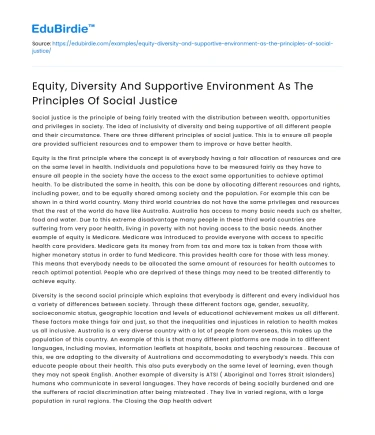Social justice is the principle of being fairly treated with the distribution between wealth, opportunities and privileges in society. The idea of inclusivity of diversity and being supportive of all different people and their circumstance. There are three different principles of social justice. This is to ensure all people are provided sufficient resources and to empower them to improve or have better health.
Equity is the first principle where the concept is of everybody having a fair allocation of resources and are on the same level in health. Individuals and populations have to be measured fairly as they have to ensure all people in the society have the access to the exact same opportunities to achieve optimal health. To be distributed the same in health, this can be done by allocating different resources and rights, including power, and to be equally shared among society and the population. For example this can be shown in a third world country. Many third world countries do not have the same privileges and resources that the rest of the world do have like Australia. Australia has access to many basic needs such as shelter, food and water. Due to this extreme disadvantage many people in these third world countries are suffering from very poor health, living in poverty with not having access to the basic needs. Another example of equity is Medicare. Medicare was introduced to provide everyone with access to specific health care providers. Medicare gets its money from from tax and more tax is taken from those with higher monetary status in order to fund Medicare. This provides health care for those with less money. This means that everybody needs to be allocated the same amount of resources for health outcomes to reach optimal potential. People who are deprived of these things may need to be treated differently to achieve equity.
Diversity is the second social principle which explains that everybody is different and every individual has a variety of differences between society. Through these different factors age, gender, sexuality, socioeconomic status, geographic location and levels of educational achievement makes us all different. These factors make things fair and just, so that the inequalities and injustices in relation to health makes us all inclusive. Australia is a very diverse country with a lot of people from overseas, this makes up the population of this country. An example of this is that many different platforms are made in to different languages, including movies, information leaflets at hospitals, books and teaching resources . Because of this, we are adapting to the diversity of Australians and accommodating to everybody’s needs. This can educate people about their health. This also puts everybody on the same level of learning, even though they may not speak English. Another example of diversity is ATSI ( Aboriginal and Torres Strait Islanders) humans who communicate in several languages. They have records of being socially burdened and are the sufferers of racial discrimination after being mistreated . They live in varied regions, with a large population in rural regions. The Closing the Gap health advertising campaign purposefully utilised the movement region, strengthening network action. It is most effective through the schooling of ATSI humans to supply health services that inroads were made to restoring relationships among ATSI humans and the broader society. Diversity shows that society can be equal no matter the circumstances, as everybody is different.
Supportive environments is the last social principle . Supportive environments refers to the environments where people work, play and live where they feel protected from threats to their health. These environments contributed to an individual’s level of health and their ability to be able to make changes to improved their health. Approaches that can increase someone’s heath need to address the social, cultural, physical and economic factors existing in people’s lives in order to create environments that are supportive of health. For example, a person who works as a paramedic and does night shifts every night, has no time for family and friends and may affect their social health. Due to them working all night, in the day they’re barely awake meaning they have no time for physical activity. This is effecting her health. The environment which a paramedic works in is creating barriers as he or she can’t play with their kids which is effecting her mental health. The work environment is effecting her physical heath as she cannot do physical activity. Changes in the work practises, could vary as her work could put a gym facility so all employees could workout in their breaks which would increase their health. Another example of a supportive environment is the inclusion of nearby parks and reserves on the town making plans, giving locations for people to get outside and encourage participation in physical activity. Being outdoors, also advantages our social fitness, as people gather at parks together which makes it more motivating. Supportive environments in any community is very important as it contributes highly to your health.
The principles of social justice all show the inclusiveness of support, diversity and showing equality to everyone no matter of their circumstances. These factors all increase your level of health to gain optimal health.






 Stuck on your essay?
Stuck on your essay?

